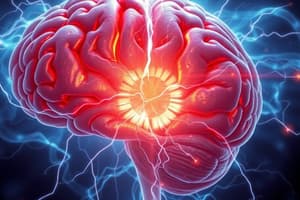Podcast
Questions and Answers
Neuropsychology studies the relationship between brain function and ______.
Neuropsychology studies the relationship between brain function and ______.
behavior
Cognitive functions include attention, memory, language, and ______ skills.
Cognitive functions include attention, memory, language, and ______ skills.
executive
Conditions like stroke and Alzheimer's disease are key areas of study in ______.
Conditions like stroke and Alzheimer's disease are key areas of study in ______.
neuropsychology
Neuropsychologists use standardized tests to evaluate cognitive functions during the ______.
Neuropsychologists use standardized tests to evaluate cognitive functions during the ______.
Neuroimaging techniques, such as MRI and ______, visualize brain structure and function.
Neuroimaging techniques, such as MRI and ______, visualize brain structure and function.
Behavioral observations help neuropsychologists understand how cognitive impairments impact daily ______.
Behavioral observations help neuropsychologists understand how cognitive impairments impact daily ______.
Emotional regulation and personality traits are examined in the study of ______ functioning.
Emotional regulation and personality traits are examined in the study of ______ functioning.
Rehabilitation programs and medication are part of the ______ in neuropsychology.
Rehabilitation programs and medication are part of the ______ in neuropsychology.
The ______ is crucial for executive functions, working memory, planning, and decision-making.
The ______ is crucial for executive functions, working memory, planning, and decision-making.
Damage to the ______ can lead to difficulties in forming new memories.
Damage to the ______ can lead to difficulties in forming new memories.
The ______ plays a significant role in processing emotions and fear.
The ______ plays a significant role in processing emotions and fear.
The ______ lobes are fundamental for spatial awareness and processing sensory information.
The ______ lobes are fundamental for spatial awareness and processing sensory information.
In neuropsychological practice, ______ programs aim to improve cognitive skills affected by brain injury.
In neuropsychological practice, ______ programs aim to improve cognitive skills affected by brain injury.
______ remediation uses structured activities to improve cognitive functions.
______ remediation uses structured activities to improve cognitive functions.
Neuropsychological assessment for ______ requires consideration of developmental milestones.
Neuropsychological assessment for ______ requires consideration of developmental milestones.
Cultural ______ must be considered when interpreting neuropsychological assessment results.
Cultural ______ must be considered when interpreting neuropsychological assessment results.
Flashcards
Neuropsychology
Neuropsychology
The study of how the brain affects behavior.
Cognitive functions
Cognitive functions
Mental abilities like attention, memory, and language.
Brain damage
Brain damage
Injury or disease affecting the brain.
Neuropsychological tests
Neuropsychological tests
Signup and view all the flashcards
Neuroimaging
Neuroimaging
Signup and view all the flashcards
Assessment
Assessment
Signup and view all the flashcards
Traumatic Brain Injury (TBI)
Traumatic Brain Injury (TBI)
Signup and view all the flashcards
Emotional regulation
Emotional regulation
Signup and view all the flashcards
Prefrontal Cortex
Prefrontal Cortex
Signup and view all the flashcards
Hippocampus
Hippocampus
Signup and view all the flashcards
Amygdala
Amygdala
Signup and view all the flashcards
Parietal Lobes
Parietal Lobes
Signup and view all the flashcards
Temporal Lobes
Temporal Lobes
Signup and view all the flashcards
Occipital Lobes
Occipital Lobes
Signup and view all the flashcards
Cerebellum
Cerebellum
Signup and view all the flashcards
Rehabilitation Programs
Rehabilitation Programs
Signup and view all the flashcards
Study Notes
Neuropsychology Overview
- Neuropsychology is a branch of psychology that studies the relationship between brain function and behavior.
- It focuses on how different brain regions and networks contribute to various cognitive and emotional processes.
- Neuropsychologists investigate the effects of brain injury, disease, and neurological conditions on cognitive abilities, personality, and emotional functioning.
- This involves assessment, diagnosis, and treatment of individuals with neurological disorders.
Key Areas of Study in Neuropsychology
- Cognitive functions: Neuropsychology explores various cognitive functions, including attention, memory (working, short-term, long-term, episodic, semantic, procedural), language (production, comprehension, reading, writing), executive functions (planning, problem-solving, decision-making), and visuospatial skills.
- Emotional and personality functioning: Neuropsychological studies also examine the impact of brain damage on emotional regulation, personality traits, and social behavior.
- Brain damage and neurological disorders: Conditions like stroke, traumatic brain injury (TBI), Alzheimer's disease, Parkinson's disease, and multiple sclerosis are key areas of study. Neuropsychologists analyze their impact on cognitive and behavioral functioning.
- Assessment and treatment: Neuropsychological assessment often involves standardized tests to evaluate various cognitive functions and identify deficits. Treatments might include rehabilitation programs, medication, and psychological support.
Assessment Methods in Neuropsychology
- Neuropsychological tests: These tests are specifically designed to assess cognitive functions. Examples include the Wechsler Adult Intelligence Scale (WAIS), the Stroop Test, and the Trail Making Test.
- Neuroimaging: Neuroimaging techniques, such as MRI and fMRI, are used to visualize brain structure and function. This provides valuable information about the extent and location of brain damage or abnormalities.
- Clinical interviews: Detailed interviews with patients and their families are crucial to gather information about their history, symptoms, and current functioning. This provides a holistic understanding, beyond the test results.
- Behavioral observations: Observational assessments of patients' behaviors and interactions help neuropsychologists understand how cognitive and emotional impairments impact daily life.
Brain Regions and Cognitive Functions
- Prefrontal cortex: Crucial for executive functions, working memory, planning, and decision-making. Damage can result in impaired problem-solving and difficulty with goal-directed behavior.
- Hippocampus: Essential for forming new memories, particularly long-term declarative memories (facts and events). Damage can lead to amnesia.
- Amygdala: Plays a significant role in processing emotions, fear, and social interactions. Damage can impact emotional regulation and social cognition.
- Parietal lobes: Fundamental for spatial awareness, attention, and processing sensory information. Damage can result in difficulties with object recognition and spatial reasoning.
- Temporal lobes crucial in memory, language processing (comprehension), and auditory processing. Damage can lead to difficulties in language comprehension and memory deficits.
- Occipital lobes: Primarily responsible for visual processing. Damage results in visual impairments.
- Cerebellum: Involved in motor coordination, balance, and some aspects of cognition, such as procedural learning.
Neuropsychological Interventions
- Rehabilitation programs: These programs aim to improve cognitive skills affected by brain injury or disease. They may focus on specific cognitive deficits, such as memory or attention.
- Cognitive remediation: This involves structured activities and exercises to improve cognitive functions. These programs often utilize adaptive learning strategies.
- Medication: In some cases, medication, such as cholinesterase inhibitors, may be used to manage symptoms associated with neurodegenerative conditions like Alzheimer's disease. These aim to help slow disease progression or mitigate symptoms.
- Psychological support: Neuropsychology often involves addressing the emotional and psychological consequences of brain damage or neurological disorders. This may mean working on behavioral issues or helping the patient and family understand the disease.
Specific Concerns in Neuropsychological Practice
- Assessment of children: Neuropsychological assessment in children differs from adults. It must address developmental milestones and cognitive abilities in a child’s expected range or potential delays.
- Cultural factors: Neuropsychologists must be mindful of cultural differences when conducting assessments and interpreting results.
- Ethical considerations: Neuropsychologists must adhere to strict ethical guidelines in their practice, especially regarding patient confidentiality, informed consent, and test administration. Ethical decision-making is important in this field.
- Forensic neuropsychology: Neuropsychologists may be involved in evaluating individuals involved in legal cases, particularly those involving brain injury or mental disability claims.
Studying That Suits You
Use AI to generate personalized quizzes and flashcards to suit your learning preferences.



